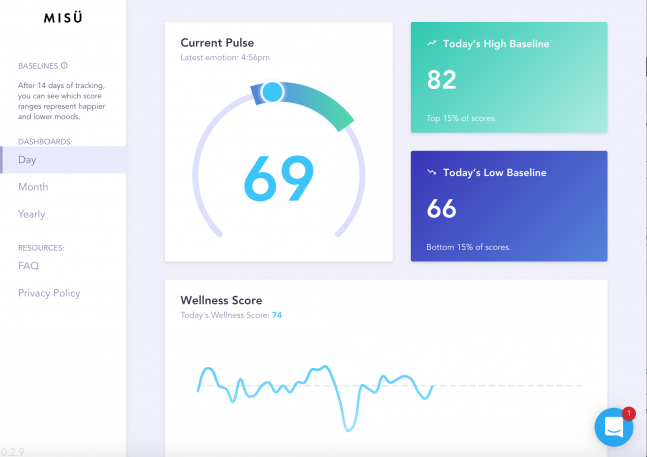If you’re feeling down lately, you aren’t alone. Bearing witness to a daily news stream of illness and death can stir up a lot of emotions. So can being isolated at home. But a new mood tracker called Misü wants to help you understand your emotional state and what might be triggering sadness, anxiety, or happiness.
Misü, which launches today as a desktop app, takes your photo surreptitiously while you’re using your computer. It analyzes these images using an algorithm to ascertain an overall mood score, and then estimates whether the websites you visit have a positive or negative impact on your mood. The app can only track emotional gestures while you’re looking at your computer, but if you spend a large portion of time in front of a screen then it is able to collect a fair amount of data. Over the course of eight hours—a normal day for a remote worker—the app takes anywhere from 200 to 400 emotion captures. Each time it logs an emotion, your computer camera’s light will turn on, alerting you that it’s taking a picture.
The app works by picking up on small cues—a furrowed brow, squinted eyes, tightness in the jaw, the curve of a smile—to predict how a person is feeling throughout the day. The app is trained on a combination of 300,000 photos and daily mood journals from approximately 10,000 people, a collection of data that founder Dan Seider obtained from users of Stigma, his first mood-tracking app.

As the app runs in the background of your computer, Misü develops a real-time score, giving you the ability to see your mood shift as you navigate from one site to another. Each person has their own baseline, though a common baseline is around 70, with happier moods ranging upwards of 80.
To test Misü’s accuracy, Seider used a portion of the personal mood assessments that had not been included in the training data. He analyzed a series of those photos with the algorithm and then checked the score it generated against the person’s written assessment. He says the algorithm is able to rate a person’s emotion correctly 86% of the time, which is on par with the Personal Health Questionnaire, a nine-question clinical screening tool for identifying various levels of depression.
Both psychologists and psychiatrists think mood-tracking apps like Stigma and Misü can help patients manage their mental health. The American Psychological Association notes that mood-tracking apps can be valuable for psychologists, too. When patients share their mood journals, it helps practitioners understand patient behavior outside the bounds of the clinician’s office. Patients can also see how certain things they do—such as working out, taking their medication, or drinking alcohol—affect how they feel.
Misü has personal significance for Seider, who was first diagnosed with bipolar disorder in his second year of college. “It completely flipped my life upside down,” he says. In the months that followed, he was admitted to a psychiatric hospital. He says he felt like he lost his liberty while staying there—a common experience for anyone who has spent time in a ward where signing yourself out is not an option.
Dan SeiderIt completely flipped my life upside down.”
In the months and years since Seider has been out of inpatient care, he’s been building tools that put patients in control of their own health. He says that being able to make decisions about his own behavior has been hugely helpful in ultimately enabling him to live a more balanced life. For instance, being able to see which websites have the most negative impact on his emotional score has helped him to avoid spending time in places that don’t benefit his overall well-being.
Misü isn’t a replacement for therapy. It also can’t diagnose a specific disorder. However, it can help you get a rough sketch of where you’re at that day or over the course of a month or year. For people taking medication to manage their mental health, Misü could help them see how drugs are impacting their mood over time.
A 2017 qualitative analysis found that one of the big reasons people with psychiatric disorders don’t take their medication is because of a negative attitude toward medication. “It took me a long time to see that medication was good for me,” says Seider, who adds that taking medication has been an important part of his own recovery. Ultimately, Seider wants people to be able to see how their mood can shift when they change even small aspects of their day-to-day, like social media habits.
Stephen SchuellerThough it may be beneficial, some people may not like the potential invasion of privacy.”
Not everyone may feel comfortable letting an app track their facial expressions or web activity. The APA notes there are privacy concerns with using apps like Misü. Some patients may not want an app running in the background, passively collecting information on them.
“Though it may be beneficial, some people may not like the potential invasion of privacy associated with this type of data gathering,” Stephen Schueller, psychologist at Northwestern University’s Center for Behavioral Intervention Technologies, told the APA in reference to any apps that passively track emotional data. He recommends that people who are concerned about privacy seek out mood-tracking apps from academic institutions like his.
In regards to Misü’s privacy policy, Seider says that photos are analyzed locally on a person’s computer and then deleted. The company does not store users’ personal information. While he acknowledges that some people may not like this approach to mood tracking, others do. He says some people prefer passive emotion tracking as opposed to active journaling because they don’t have to think about it.
On launch, Misü is free. Eventually, Seider says that there will be an opportunity to subscribe as a paying customer for additional features, which are still under development. Ultimately he hopes Misü will be able to track other things that impact mood, such as fitness and sleep.
Recognize your brand’s excellence by applying to this year’s Brands That Matter Awards before the early-rate deadline, May 3.
